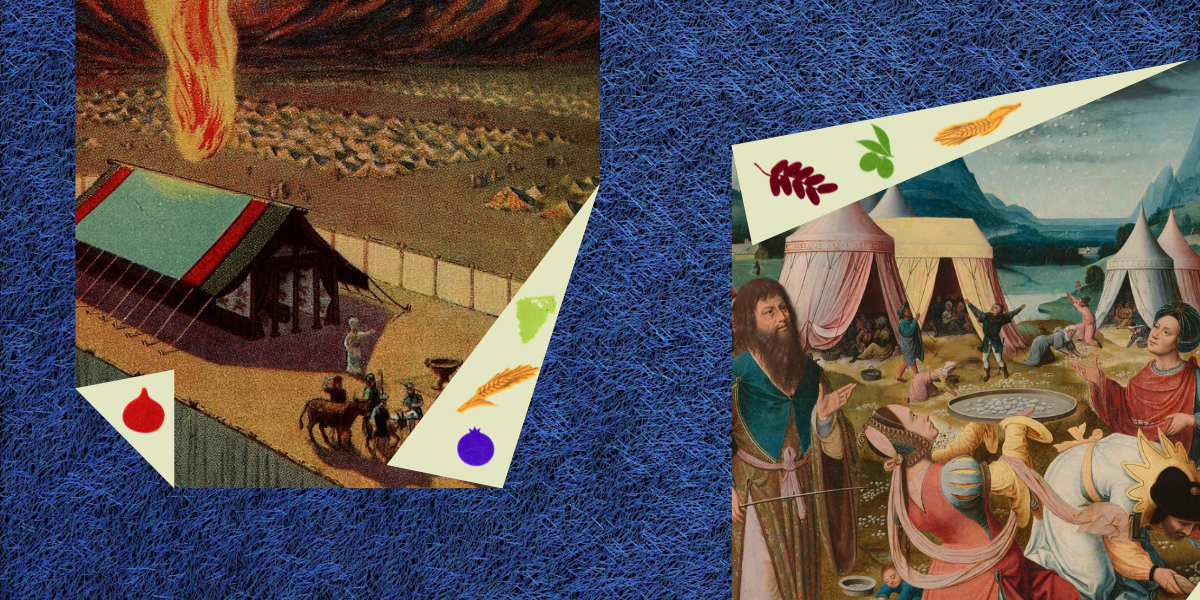About Hebrew
Preferential Treatment

What do the tabernacle, manna from heaven and the seven special agricultural species of the Land of Israel have to do with each other and with today’s editors and grocery stores? They all converge when one studies the Hebrew root ע–ד–פ (ayin, dalet, feh), which means to prefer, an excess of something, in addition to other meanings.
The root is found in the many questions and conundrums that come up in Scriptures about the Israelites’ time in the desert after the Exodus. These include a discussion of how to deal with the עֹדֵף (odef), “overlapping lengths [of the cloth that cover the Tabernacle].” In another discussion of an excess connected to worship in Numbers, a census taken of the Israelites refers to 22,273 first-born sons originally obligated to serve in the Tabernacle and the 22,000 Levites who replaced them after the sin of the Golden Calf. The עֹדְפִים (odfim), “273 Israelites who were in excess [of the number of Levites],” had to be redeemed by a payment of 5 shekels per head. The text also uses our root to make a (miraculous) point about manna: Not only did someone who gathered less than his family’s allotted portion not fall short come evening, but one who gathered more than his daily share לֹא הֶעְדִּיף (lo he-edif), “had no excess.”
Using our root, the Talmudic sages discuss the seven species of the Land of Israel—wheat, barley, grape, fig, pomegranates, olive (oil) and date (honey). Is one of them, they ask, עָדִיף (adif), preferable, to the others? Some rabbis answer, יֵשׁ הַעֲדָפָה (yesh ha’adafah), one species, wheat for example, is to be preferred. Others respond that אִין עֲדִיפוּת (ein adifut), there is no preference to be made here.
In the Fifth Commandment, honoring your father is mentioned before your mother. Nevertheless, rabbinic literature insists that the honor due one’s father is in no way עוֹדֵף עָל (odef al), “more important than,” honoring one’s mother.
Our root has many everyday usages. Buying a soft drink at a grocery store? If you don’t care for the bubbly variety, tell the clerk אַנִי מַעֲדִיפָה לֹא מוּגָז (ani ma’adifah lo mugaz), I prefer non-carbonated. If you pay for the drink with cash, don’t forget to ask for your עֹדֶף (odef), change.
Those who areעֹדֶף מִשְׁקָל (odef mishkal), overweight, may want to opt for a healthy diet, rather than one of the fad diets or pharmaceutical treatments among the עֲדִיפָה (adifah), oversupply, of lose-weight-quick schemes around today.
An astute editor might ask a verbose author to cut the מִלִּים עוֹדְפוֹת (millim odfot), superfluous words, from a book or article. Though, like this one, any article on Hebrew roots lends itself to an overabundance of discussions.
Joseph Lowin’s columns for Hadassah Magazine are collected in HebrewSpeak, Hebrew Talk and his most recent book, Hebrew Matters, available at gcrr.org/product-page/hebrew-matters.









 Facebook
Facebook Instagram
Instagram Twitter
Twitter
Leave a Reply